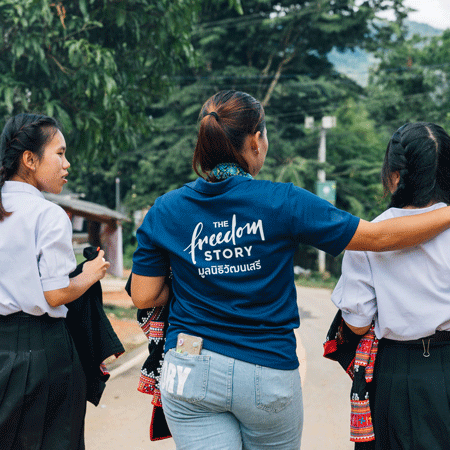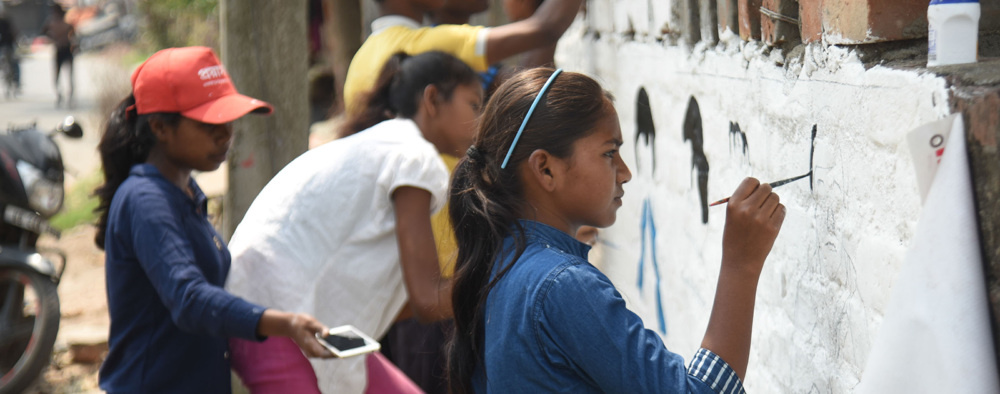
Segurança e bem-estar
Educação, Justiça de gênero, Segurança e bem-estar, Poder da juventude
The COVID-19 pandemic has disrupted nearly all aspects of life for the partner organizations GFC supports. In an effort to better understand the experiences of these community-based organizations during the pandemic, GFC conducted a global survey with 60 partners in July and August 2020. Partners told us how they were faring during this crisis. They provided feedback on the aspects of their organizations that were being most impacted, their worries about running their organizations, their concerns about the young people and communities they serve, and how they were coping and building resilience.
The GFC team developed the survey through a participatory process, and the anonymous questionnaire included both questions for which respondents could select from several applicable answer options and several open-ended questions. Of the 89 partners contacted, 60 participated in the survey, putting the overall response rate at 67%. More than 35% of respondents represent youth-led organizations (under 30 years old) and 61% identified as majority female organizations. In terms of the regional breakdown of the respondents, 35% were from the Americas, 30% from Asia, 23% from Africa, and 12% from Europe and Eurasia.
In terms of overarching concerns about running their organizations, one of the major areas partners pointed to was the emotional health and wellbeing of staff (82%), followed closely by the physical health and safety of staff (78%), and uncertainty about the future (75%). (Partners could select more than one answer option.) One partner summarized their concerns like this:
“COVID-19 will almost certainly have lasting effects on communities. Will the sector have the energy to respond to these needs after the emergency response it has been delivering so far? Will there be resources around to support the sector to do so?”
Concerns about wellbeing come as no surprise. With restrictions in place around the world, many of the partners’ regular activities halted. In the survey, 58% of respondents said that staff at their organization were allowed to work remotely, and 35% reported that staff were required to work remotely. Working from home has turned work-life balance on its head. Staff at partner organizations are spreading themselves thin and finding it increasingly difficult to keep up. In particular, many women are struggling with an increased workload as they juggle jobs, household duties, and taking care of children whose schools are closed. More than 60% of our partners globally are maneuvering between providing emergency relief – something many of them had never done before – and continuing programming in a format adapted to new constraints.
Although 65% of respondents said that their staff had shifted partially or entirely to working virtually (see Figure 1), for many, access to technology and/or a reliable internet connection remains a challenge. An even bigger challenge for partners is reaching their program participants, since many of them are children and youth who do not have access to technology and/or internet. At the time of the survey, 40% of respondents had suspended all in-person programming. One partner reported:
“We have had to suspend face-to-face training activities aimed at adolescent girls, and working at a distance with them is complicated since the vast majority do not have a telephone or internet access …”
The financial uncertainty is another significant concern for our partners, with 38% reporting a significant reduction in funding, and 50% monitoring or reducing spending.
One of the biggest struggles partners reported was securing core funding as donors reoriented funds toward COVID-19 relief efforts, suspended grants that were normally renewed on an annual basis, and eliminated the possibility of future funding. A partner working to support adolescent girls expressed this worry: “We had applied [for funding] with another donor who told us that because of the situation, they had to change plans. This affects our work greatly, since one of our goals is to reach more girls, adolescents, and young women.” Other respondents mentioned that new funding opportunities were more restrictive in nature, that their grant applications were stuck in limbo, and that they were seeing a domino effect of funding cuts. One partner said:
“We have strong local donors and most of them are also affected by the COVID-19 pandemic, so our source of funding is also decreasing day by day.”
Beyond these challenges, partners provided examples of workforce concerns including staffing cuts, reduced hours, financial instability for staff and their families, and a decrease in volunteers (see Figure 2). Partners who have had to lay off staff expressed concern over shifting to more project-based, short-term hires, which could lead to a lack of continuity and trust in the community – something that is essential to our partners’ work.
Throughout the survey, partners from around the world also lamented the government response to the pandemic in their countries, from a lack of strong directives to a backlog at government agencies to unrealistically strict lockdown measures.
While partners acknowledge that the pandemic is a major concern for children and youth, many worry that other pressing issues that existed long before COVID-19 are being neglected and exacerbated. Some areas in which partners expect major setbacks to their work include child protection and safeguarding; violence prevention; access to education, income, and health and psychosocial services; and advocacy.
When asked to describe their concerns about the challenges facing children and young people in their communities (see Figure 3), health and safety came first (90%), followed by access to education (72%), domestic violence and abuse (65%), access to food (65%), and access to psychosocial and mental health services (63%).
Specific examples alarming partners included increased abuse, higher rates of early and forced marriage and pregnancy, increased rates of sexually transmitted infections (STI) and HIV, child labor and exploitation, and drug and alcohol abuse. One partner said:
“We have sourced 47 child sexual abuse cases through the Child Welfare Committee during the [COVID-19] period and have started working with the victims.”
We asked partners to share how they are coping during the pandemic, and they shared the diverse ways in which they are adapting to the situation and building resilience:
In March, GFC launched an Fundo de Resposta a Emergências to issue immediate grants to our local partners. As of early November, we had approved $570,000 in emergency grants para 130 partners in 37 countries, but needs continue to grow. In addition, GFC has been continuously exploring and applying for funding opportunities around the world aimed at COVID-19 emergency relief, as well as longer-term planning.
GFC continues to support local organizations by providing unrestricted funding, capacity support, and assistance with safeguarding practices as partners shift from emergency relief to longer-term adaptation and resilience. Together, GFC and community organizations are planning responses that will help protect and empower young people both during and after COVID-19. GFC has also joined more than 700 funders in a call to action to strengthen the global COVID-19 response, calling for increased flexibility, support, and trust during a time of unprecedented hardship.
Early in the pandemic, the GFC team also pivoted to providing virtual support to our partners. Through regional partner calls, thematic conferences, webinars, and workshops co-designed with partners, as well as funding referrals, leadership dialogues, and increased check-ins and follow-ups, team members are going the extra mile to be supportive and responsive to our partners around the world.
Below, we have listed some suggestions for supporting grassroots partners:
Header photo: In Kolkata, India, before the pandemic lockdown, youth leaders from GFC alumni partner Prayasam painted communicative murals with COVID-19 prevention techniques. © Prayasam
